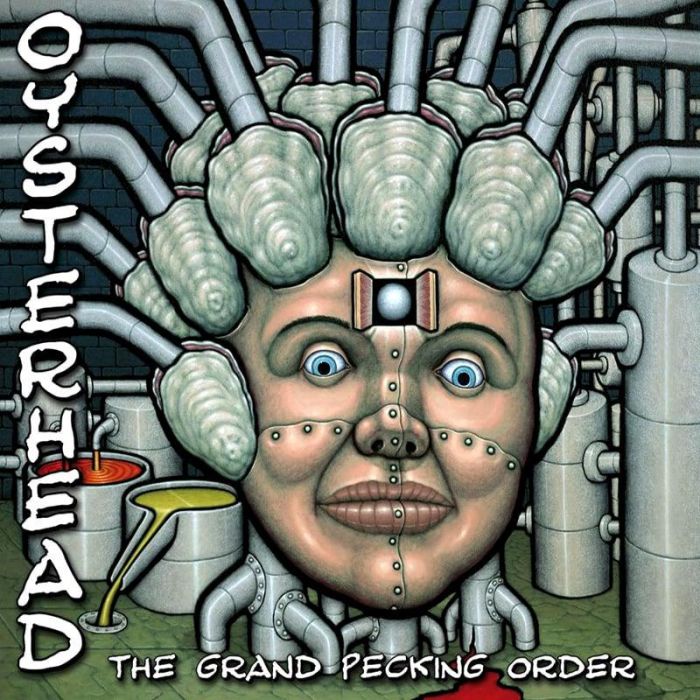The Grand Pecking Order by Oysterhead (Review)

Take three completely unrelated musicians. Throw them into a recording studio after a successful one-time gig at a New Orleans jazz festival. Mix thoroughly. Enjoy. Trey Anastasio (Phish), Les Claypool (Primus), and Stewart Copeland (The Police) seemingly have nothing in common, with the exception that their bands all start with the letter “P.” However, their collaborative project Oysterhead manages to fuse three extremely dissimilar musical styles, and churn out a finished product that’s as polished as a band pushing its 25th anniversary. The styles weave themselves throughout each other like a well-crafted quilt, as is evidenced by the band’s first, and hopefully not last, project, The Grand Pecking Order.
With such distinctive personalities at the helm, my first fear while listening to this album was that it would end up being a fight for the wheel, ending in a stylistic disaster of album and a musical wall. Les Claypool, for all intents and purposes, is Primus, with various contributing musicians adding to his style. His idiosyncratic bass style has the ability to overpower any song in existence, and his eccentric lyrics make you think and giggle, or just ask, “What the hell is he talking about?” His nasal faux-Southern drawl — Mr. Claypool is a California man — captivates the listener and puts an even more oddball spin on the already intriguing lyrics.
On the other side, Trey Anastasio has spread himself over so many musical genres that his very presence on stage alerts the audience that something awesome is about to occur. He’s worked heavily in experimental jazz, trained in classical composition, and was instrumental in the creation of the biggest jam band since the Grateful Dead.
With all of this said, the two musical heavyweights balance the album quite well, passing the mic as frequently as a wrestling tag-team, with Stewart Copeland displaying versatility on the drums that we rarely saw during his stint with The Police. Some songs are predominantly Claypool, like “Shadow of a Man,” “Pseudo-Suicide,” and “The Grand Pecking Order.” They smack of thick and funky slap bass, very driving drum rhythms, and the patented Primus drawl. Some are clearly Anastasio, like “Radon Balloon,” “Birthday Boys,” and “Polka Dot Rose,” and are more mellow, melodic, and often jazzy.
But the real gems of the album — not that the aforementioned songs are bad — are the songs during which you can’t tell who had the larger influence. “Mr. Oysterhead,” “Owner of the World,” and “Oz Is Ever Floating” all fuse heavy bass thumping with the atmospheric guitar hums and jazz chords. Les and Trey’s voices are bizarre compliments, with Claypool’s drawl melodically accompanying Anastasio’s clear and smooth voice. Copeland’s drumming is impeccably tight, fusing the two styles like a seasoned welder. The songs showcase Claypool’s outstanding bass licks, quickly interrupting them with carefully toned jazz guitar. It’s an outstanding brew.
Other songs are much trickier. “Army’s on Ecstasy” begins with Claypool’s patented storytelling song speak, in which he proudly proclaims his tale as though he were a barker of a seedy southern tonic. However, throughout the song, it becomes increasingly apparent that we’ve been had, and the last two minutes are a jam band dreamscape, dropping into a break that’s reminiscent of Lynyrd Skynyrd’s “Free Bird.”
“Wield the Spade” finds Stewart Copeland at the microphone, vehemently blasting a speech that rivals a Marxist rally, calling to arms the working class. “Wield the spades/Ready the blades” rings through the song like a secret battle cry, masking the revolution from those in power. All the time, the rally is being carried by waves of mellow ostinato guitar licks and quick-paced light cymbals.
Although this type of experimentation and fusion of styles often happens in the Jazz field, very rarely do we find such a successful combination as we have with Oysterhead. Audioslave was a disappointment, and Velvet Revolver isn’t necessarily matching Stone Temple Pilots, although it takes little to surpass Guns N’ Roses. Oysterhead challenges this curse of the rock band fusion and comes out on top, smiling toothy grins. Their album consistently keeps the toes tapping, with the levels of funky always pulled to 10. The trio seems to have parted ways for now, but my biggest wish is for them to jam themselves into the studio again to try out newer directions. An album as unique as this rarely comes around.
Written by Guy Thillet.